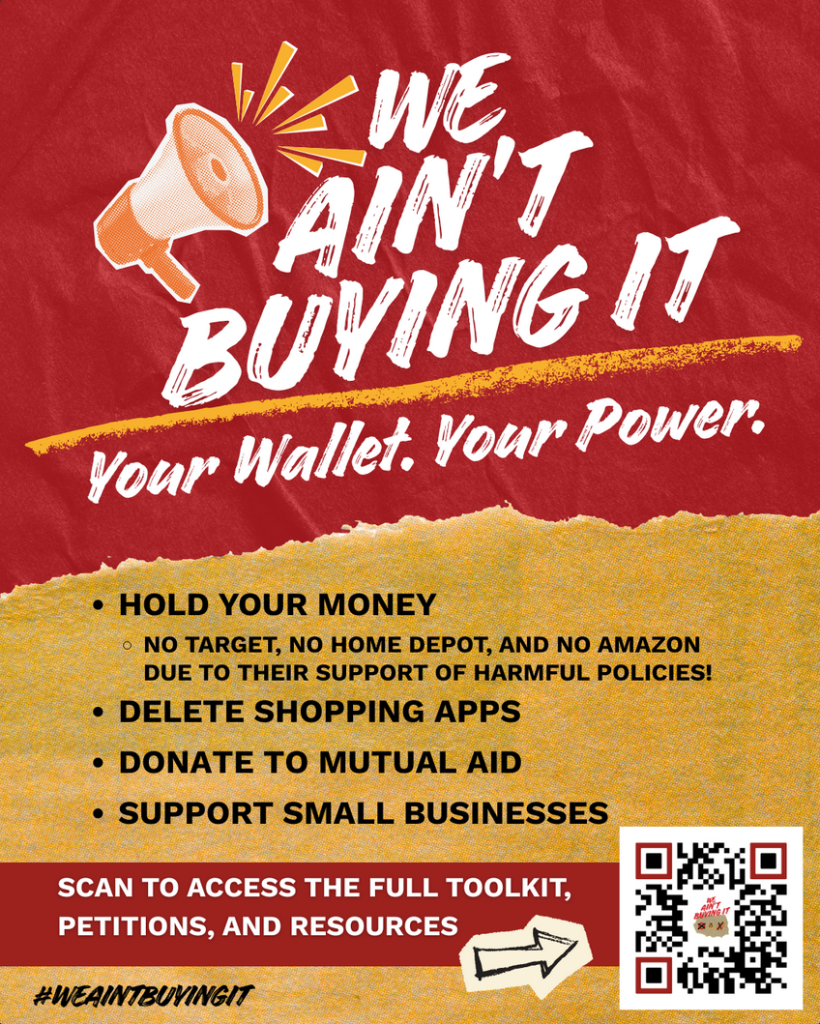Boycott Fatigue
Boycott Amazon! Buy at better places! But not Target…they cancelled DEI. And is that ACE franchise MAGA-owned? It’s hard to keep up with who we’re avoiding — and what they own. We propose reversing this math: create a hierarchy of places to shop from best to worst and shift our money to do good.
THANKSGIVING '25: there are numerous economic boycotts being proposed. We endorse "We Ain't Buying It" from Black Voters Matter. 
How to do it:
First, take stock of your values. What issues matter most to you? Consider issues from homophobia to environmental degradation. Labor rights to owner politics. This will help you prioritize.
Next, consider urgency : never crossing a union picket-line should be a high priority. This is what a boycott was, traditionally: a refusal to purchase until specific requirements were met. It required near-universal participation, and a plan to help people participate. Also support concentrated, focused efforts whenever you can, like replacing Black Friday with “Buy Nothing Day.”
Boycotting Amazon, Walmart and Hobby Lobby is different, though. These are massive economic players that can be hard to avoid, and there is no specific goal. Hobby Lobby isn’t going to stop stealing biblical artifacts from Middle Eastern countries while openly discriminating in the name of “religious beliefs” and you aren’t going to put them out of business. You can help the local art or fabric store stay open, though! Every purchase you shift helps maintain options for the future.
Walmart is the only grocery store in some small towns—they made sure of that. I boycot Walmart because I oppose that reality, and I still have other options. If you don’t, you’re the victim, so don’t feel guilty doing what you need to do. Buy from better options whenever you can.
Amazon Prime is essential to many disabled people. If you know someone who relies on delivery, consider offering shopping services occasionally. Help, don’t shame. We all make concessions to reality.
Boycotts imply a call for perfect compliance, but that isn’t realistic for many of the economic pressure campaigns we call boycotts today. We need a more sustainable plan, because economic pressure is powerful, but activism has to take people’s reality into account.
Enter what I call “ranked choice buying.” The idea is we “procott” places we support. This is where we take our own list of values and we rank our options for a given area of purchase. I’m going to put a word in for local purchases here : while the owner of your local hobby store might be as far-right as the owners of Hobby Lobby, they are smaller, easier to pressure, and more of your money will stay in the local economy. All things being equal, I always choose the small, local option first.
Here’s what that might look like for a hardware store purchase:
- First, we look for a local specialty shop. Many areas still have plumbing, electrical and other single-purpose shops that carry materials for pros in that field. Most are open to the public. Start there and check prices. If I can afford it, I’m willing to spend more from these stores. The quality is usually better and one of my values is avoiding cheap, disposable goods.
- For larger items we also check used options. From light fixtures to doors, we can often participate in the recycling community, which also fits our values.
- Next we shop at local chains like Franks Door Store or McLain’s Hardware. We don’t know the owner’s politics, but at least the money stays local.
- Franchise stores like ACE are next. Same reason, though licensing fees leave the area.
- Finally we buy from the big-box stores based on convenience and price. We favor Lowe’s marginally over Home Depot, but the same guy who donates to right-wing candidates also substantively funds a TBI clinic that treats veterans and other head-trauma patients, entirely free, in Colorado. Value judgements are complicated, and that’s a personal issue for us.
- Finally we’ll buy from Amazon if we can’t buy it off the shelf locally.
By taking this approach, we’ve made it easier to shift our dollars. You can do the same with groceries, craft supplies, clothing — anything you buy will have local, ethical options that may not meet all your needs. Shift as much money to better options as you can, to preserve those options and build on them.




